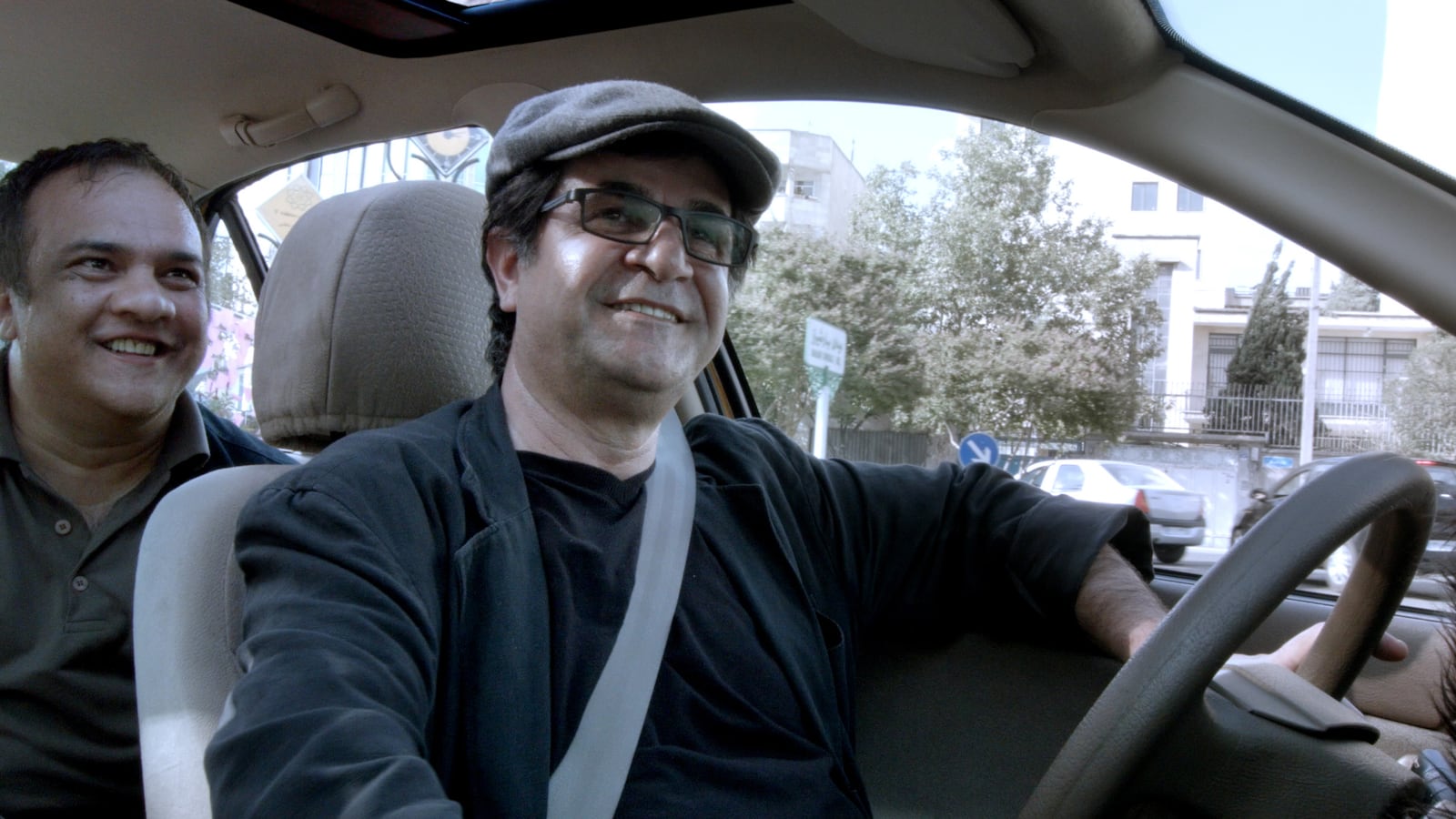This weekend sees the return of an outlaw to theaters. Not mass murderer Whitey Bulger, not prankster and tightrope walker Phillipe Petit, but Iranian filmmaker Jafar Panahi, back with a genius new film, Taxi.
Panahi began making feature films in the ‘90s after a period of apprenticeship under fellow Iranian New Wave auteur Abbas Kiarostami. Together, Kiarostami and Panahi brought Iranian cinema to an international stage—now Kiarostami makes films in exile and Panahi makes films under threat of arrest.
Though Panahi has never been a stranger to controversy, tides turned for the worse when Mahmoud Ahmadinejad became president of Iran in 2005. Ahmadinejad and his conservative allies enacted stricter laws and punishments for those who were deemed critical of the state, including Panahi. Between 2005 and 2010, Panahi was only able to complete one feature-length film—the docudrama Offside, which followed a group of women who disguised themselves as men in hopes of illegally attending a soccer match.
During Ahmadinejad’s time in power in Iran, Panahi was arrested several times on trumped-up charges, culminating in 2010 when he was sentenced to six years of imprisonment and a 20-year ban on leaving the country or in any way attempting to make a film. According to Iran’s Ministry of Culture and Islamic Guidance, the harsh sentence stemmed from Panahi’s attempt to make a documentary on the Iranian Green Movement in the wake of Ahmadinejad’s controversial 2009 re-election, which they deemed “propaganda against the Islamic Republic.” Panahi’s prison sentence was cut short following international protest and his own hunger strike, and he was permitted to come home on the condition that he would be placed under house arrest and not make films.
But make films he did, beginning with 2011’s This Is Not a Film and continuing with 2013’s Closed Curtain, which were both made inside Panahi’s home. Panahi’s films have not been legally exhibited in Iran since the ‘90s, and in order for This Is Not a Film to make its premiere at the Cannes Film Festival, it was famously smuggled out of Iran on a flash drive hidden inside a birthday cake. However, with his latest effort Taxi’s Golden Bear triumph at the Berlin Film Festival this February, there was some hope that the more liberal regime that has replaced Ahmadinejad would allow the film to be seen by Panahi’s countrymen.
But the possibility for broader exhibition isn’t the only way Taxi is different from This Is Not A Film and Closed Curtain. For one thing, Ahmedinejad is no longer in power, and the current Iranian government, led by Hassan Rouhani, has taken a more centrist stance on policy, including the recent de-escalation of Iran’s nuclear plans. With President Rouhani at least giving lip service to increased freedom of expression, what it means for Panahi is that Taxi is less a film made under threat than it is one that’s been made in limbo. Panahi is too famous for the Iranian government to arrest without international consequences and so he continues to make films under empty threat of imprisonment. That the ban on Panahi’s filmmaking persists at all is bureaucratic hypocrisy at its finest.
But with Taxi, Panahi answers Iran’s hypocrisy with humor and a return to the gentle humanism that made his early films so popular.
Taxi follows Panahi on a day working as a cab driver. Panahi, as himself, drives around Iran’s capital city of Tehran, picking up customers and friends, and observing their conversations with hidden cameras. Among the distinguishing features of Panahi’s filmmaking is a subtle manipulation of the boundary between fiction and documentary, and Taxi makes the most of its simple premise by blurring the lines of what is and isn’t real.
Characters recognize Panahi, they acknowledge the camera, and Panahi even includes scenes that reference his older films—but the proceedings never become a gimmick because Panahi finds a way in his scenario to keep the essential stakes of the film true. Panahi is making a film about himself making films, and whether or not the scenes themselves are staged, the risk for Panahi and his actors remains the same.
The film then becomes a lesson not just on how to resist oppression, but how an artist can use oppression to enliven and even expand their art. Panahi’s camera never leaves the tiny space of his taxi cab, and yet Panahi’s ideas seem to expand without limit.
I thought the movie couldn’t top its first shot—which begins with the cab facing out towards Tehran as Panahi picks up two passengers, only for Panahi himself to turn the camera around at his passengers, a man and a woman who appear to be strangers, as they debate crime and punishment in Iran. The shot passes unbroken for several minutes, and in the time that the passengers argue you begin to wonder if what you’re seeing is real or if it’s a scenario Panahi has manipulated the same way he manipulated the camera. It’s an exhilarating open, but when the second shot completely reframed the context of that first moment, I knew I was in for something extraordinary.
In a way, the restrictions that Iran has placed on Panahi’s filmmaking remind me of the Hays Code restrictions favored by filmmakers like Alfred Hitchcock, who then experimented with restricted space in films like Lifeboat and Rear Window as metacommentary. It’s hard to remember the last film I saw that felt as purposeful as this one. Panahi finds freedom in every cut, in every camera movement, in every new passenger of his car.
It is telling that despite the end of his house arrest, Panahi chose to restrict his film to a space even smaller than a prison cell. Living under rule of censorship, freedom becomes not a matter of space, but a matter of the mind.






